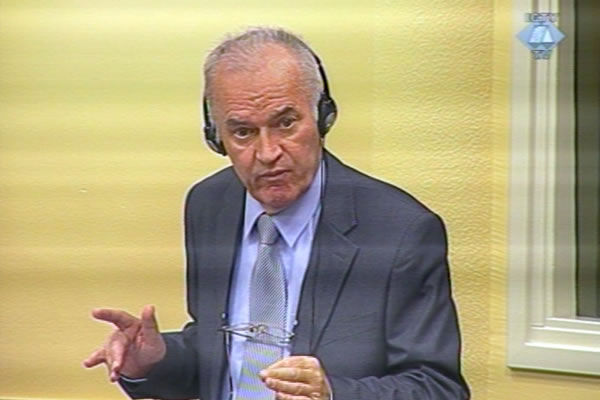Home
WITNESSES FOR ‘FIRST SEGMENT’ IN THE CASE AGAINST MLADIC ANNOUNCED
In the introductory segment of the prosecution case at the trial of the former Bosnian Serb army commander, the prosecution will call six survivors of mass executions, two insiders, three journalists and several international observers. The witnesses’ evidence will relate to the crimes against non-Serbs in BH from 1992 to 1995, including the terror campaign against citizens of Sarajevo and the Srebrenica genocide
 Ratko Mladic in the courtroon
Ratko Mladic in the courtroon The prosecution submitted the list containing the names of the first group of witnesses, scheduled to appear at the trial of former Bosnian Serb army commander Ratko Mladic from 29 May to 13 July 2012. The list contains six survivors of mass executions alleged in the indictment, seven international representatives who were in BH during the war, three war reporters and several witnesses who will testify about the conditions in military detention facilities.
The first on the prosecution’s witness list is Elvedin Pasic. In November 1992, Pasic survived the execution of about 150 persons in the village of Grabovica in Kotor Varos municipality. It remains to be seen if Pasic will be the first to appear in court. In the motion filed today, the prosecution indicates the final order of appearance of its witnesses will be decided in consultation with the defense in order to make it easier for the defense to prepare for the cross-examination. The prosecutor told the Trial Chamber that all the documents necessary for the cross-examination of the first group of witnesses had been disclosed to the defense.
Five other survivors of mass executions in the war in BH are on the prosecution witness list. One of the protected witnesses will testify about the murder of 150 persons in the village of Biljani near Kljuc. Another protected witness will give evidence about the massacre of civilians in Jelasicko Polje near Kalinovik. Rajif Begic will recount the murder in the village of Vrpolje in Sanski Most municipality. All these crimes were committed in 1992. A survivor from Branjevo, a Srebrenica execution site in July 1995, is also on the witness list.
A Dutch Battalion soldier Eelco Koster, UN observer Joseph Kingori, a medical doctor whose identity will be protected, journalist Robert Block and a key insider witness, Momir Nikolic will testify about the crimes in Srebrenica. Nikolic served as the security officer in the VRS Bratunac Brigade and pleaded guilty to the charges against him before the Tribunal.
SKY News war correspondent Aernout Van Lynded will testify about his experience in the besieged Sarajevo. Two protected witnesses who survived the shelling from the VRS positions in Sarajevo are also on the list. An insider witness, a senior officer of the Bosnian Serb army, will testify about the orders issued to the VRS snipers during the siege of Sarajevo. Former UN observers in Sarajevo Richard Mole and John Wilson are also slated to give evidence, as is John Jordan, former chief of the fire brigade operating in Sarajevo under the UN auspices.
Sefik Hurko, who was detained in the Vlasenica camps, and Idriz Merdzanic, who worked as a doctor in the prison infirmary in Trnopolje, will testify about the crimes in detention centers under the VRS control. Ed Vuillamy, who wrote for the British newspaper The Guardian, will testify about the prison camps in Prijedor.
Former head of the civil affairs in the UN mission David Harland is also on the witness list. Harland will testify about his meetings with the accused Mladic and Karadzic. General Sir Richard Dannatt, former chief of the British Army General Staff, will appear as a prosecution military expert.
All these witnesses will testify as a part of the first segment of the prosecution case, which will present a general overview of the crimes Ratko Mladic is charged with. In the remaining four segments, expected to follow after the summer recess, the prosecution will call detailed evidence about the crimes committed as a part of the four joint criminal enterprises alleged in the indictment. The first joint criminal enterprise is the ethnic cleansing aimed at the forcible and permanent elimination of Bosnian Muslims and Croats from large parts of BH in 1992. In some BH municipalities, this ethnic cleansing reached the scale of genocide. The three remaining joint criminal enterprises are related to the artillery and sniper terror campaign against civilians in Sarajevo, taking UN staff hostage in May and June 1995 and the Srebrenica genocide in July 1995.
The prosecution is due to present its opening statement next Wednesday and Thursday.
Linked Reports
- Case : Mladic
- 2012-05-04 MLADIC TRIAL WILL NOT BE POSTPONED
- 2012-05-03 WILL DELAYED DISCLOSURE POSTPONE MLADIC’S TRIAL
- 2012-04-26 MLADIC’S DEFENSE INSISTS TO POSTPONE TRIAL
- 2012-05-11 MLADIC SEEKS TO DISQUALIFY JUDGE ORIE AND FOR A STAY OF PROCEEDINGS
- 2012-05-14 MLADIC AGAIN ASKS THE JUDGES TO ADJOURN HIS TRIAL FOR SIX MONTHS
- 2012-05-15 MLADIC’S MOTION TO DISQUALIFY JUDGE ORIE DENIED
